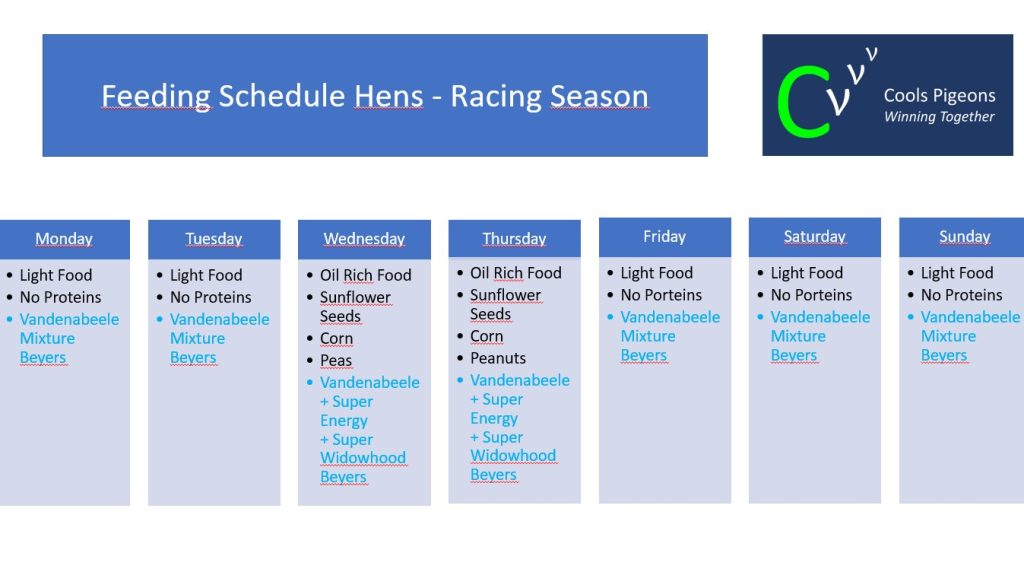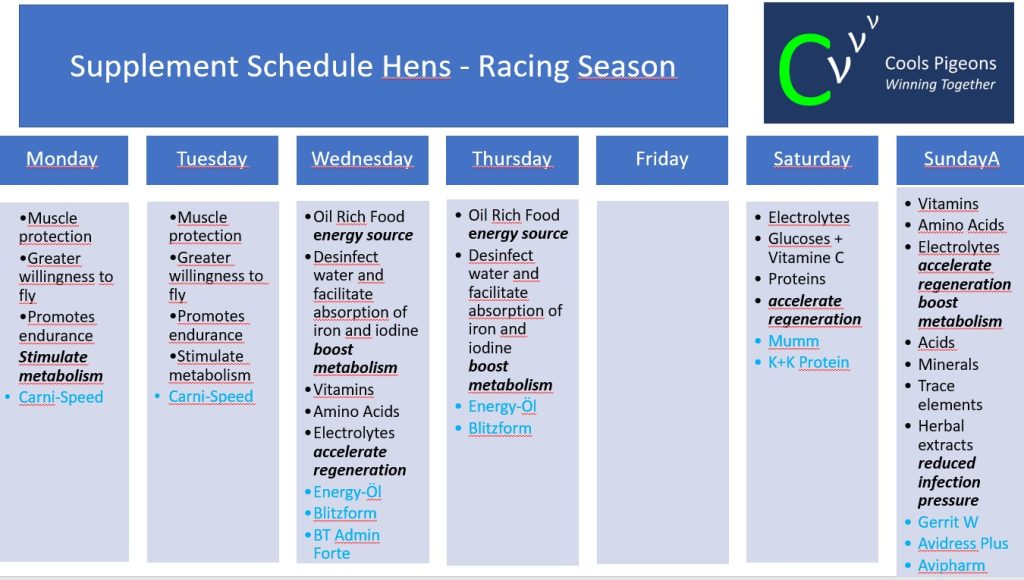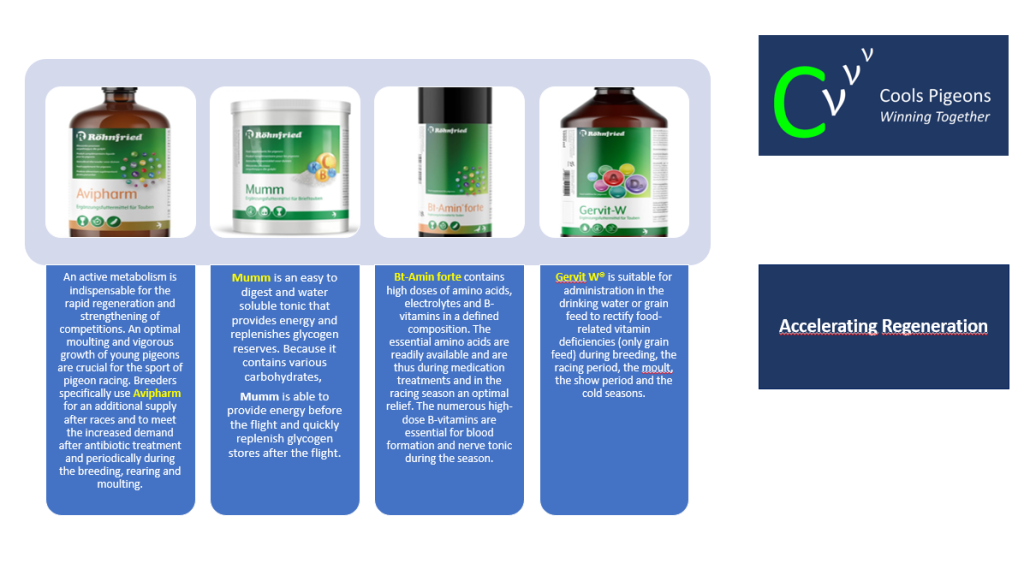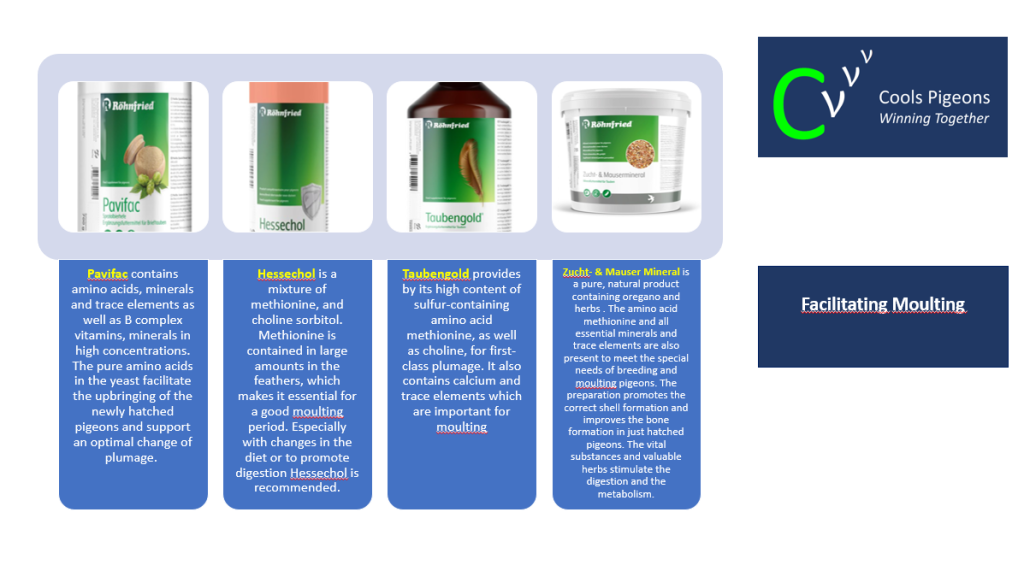Racing hens, how Röhnfried products help
My adventure of pigeon racing started over 30 years ago. And although I consciously decided to keep my loft rather small I was selected for years now to be part of the Röhnfried racing team of which I am really proud. I am specialized in racing hens at 300-600 km. Roehnfried Team – Rik Cools
Why Hens?
- Since I only had 2 good cocks but 5 good hens after the first year, I decided to start racing hens as one of the pioneers in my area. Now 50-60% of all fanciers in our area are racing hens.
- Another push in that direction came from Astère Vergotte, a colleague of mine at school where I was teaching. Every break “pigeons” were the topic of our conversations. Astère became my coach on racing hens and gave me a lot of very useful tips. How to avoid the hens to pair, how to train and feed them, …
- But playing with hens also fitted my busy schedule of combining school with family in the best way.
- Hens are also more reliable in their performance. When you have a good hen and play her 5 times, she should be 4 out of 5 in the top. Cocks however would be only 2-3 times performing very well. Their performance is more variable.
- Hens have a shorter regeneration period. They can be prepared in two days for the race, contrary to cocks who need 4-5 days.
How to avoid pairing between hens?
- The feeding system. It is important to feed them very lightly in the beginning of the week and avoid proteins. +/-15g in the morning and +/-15g in the evening. During the last 2 days of the week they get extra sunflower seeds, corn, peas and Röhnfried products as Energy-öl. After finishing all their food they get a bit of corn to ensure that they have sufficient food till Saturday morning.

- Race them every week for 6-7 weeks in a row. They are basketed on Thursday evening and arrive back home on Saturday. 2-3 times 300 km; then 400 km, than 600 km, another time 500 km and sometimes back once to 100 km. I look at the condition of the hens (how they look, how they train).
- When playing middle distance, the hens can stay with their partner from Saturday afternoon when they come home from the race till Sunday morning. I let them together when all the pigeons are home, so about 1 hour later. They always get the same cock/partner. After that the hens go back to the aviary during the day (5-6 hours)and at night they sleep in the loft. The aviary is covered, oriented to the northern side which means that it is cold there. In the morning they train, they get fed in the loft. They are not allowed in their nest boxes.
- Selection. My pigeons have been selected for years to minimize pairing between hens. If I have problems now, it is mainly with new pigeons that I bought from other lofts.
How to control their health?
I use a number of Röhnfried products to stimulate their metabolism, to accellerate regeneration and to reduce their infection pressure.



But one can not underestimate the importance of a good treatment during winter time when winners of the coming season are made. I keep the hens in an open aviary. Then it is all about moulting. Next to adapted food, I add Taubengold to their water on a regular basis and Hessechol and beer yeast – Pavifac – on their food. Of course Zucht und Mauser Mineral is essential in this period.

But…observing is crucial. Racing pigeons is observing, observing, observing.
- When I see that the condition of the pigeons is not good, I involve the vet. But it is not given that he will find the main cause; partly because loss in condition is not always caused by infections.
- I sometimes put them 4-5 days on a tea with garlic diet to regenerate. In combination with some rest – one flight of 200 km only. Rotosal is also a good product to help accelerate their regeneration.
- During the racing season the vet checks every 3 weeks for trichomoniasis and coccidiosis. I only treat them when they have symptoms, otherwise I leave it alone. I limit medication to 2-3 times/year. Not more than 2-3 days per treatment during the racing season since I believe that medication only works during a short period and long term treatments are rather having a negative effect.
- At the start of the racing season the birds have to be 100% fit.
More info on Röhnfried Products
For more info on all Röhnfried products go to



